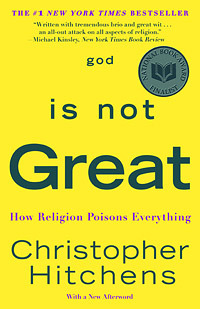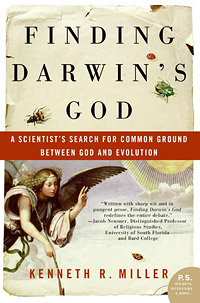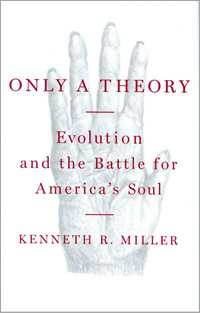In this week’s eSkeptic:
A DEBATE BETWEEN
Christopher Hitchens & Kenneth Miller on:
“Does Science Make Belief in God Obsolete?”
In last week’s eSkeptic, we presented Christopher Hitchens’ answer to the question “Does Science Make Belief in God Obsolete?” This week, we present the same question in the form of a debate between Christopher Hitchens and Kenneth Miller. Hitchens (self-proclaimed anti-theist and author of God Is Not Great) and Kenneth Miller (a pro-evolution Christian and author of Finding Darwin’s God) are worlds apart both by profession and belief, and yet both have brilliant minds for dissecting arguments both scientific and philosophical. First, Hitchens comments on Miller’s essay, followed by Miller’s response, and then the remaining dialogue between the two. This debate was edited by Michael Shermer for the Templeton Foundation’s Big Question Essay Series.
A debate between
Christopher Hitchens & Kenneth Miller
edited by Michael Shermer

Christopher Hitchens (1949–2011). Photo by Christian Witkin.
Christopher Hitchens: I am not scientifically certified in any field, but when I read a “creationist” account of an Eden-based evolutionary fairy-story, I consider myself sufficiently qualified to understand and to refute the mental process by which it is argued. On the other hand, I do possess some small qualifications in the world of language and its relationship to cognition and I have to confess that I simply cannot make sense of a single one of your most important assertions or (perhaps I should better say) avowals.
What does it mean to say, “The Deity they reject so easily is not the one I know”? If you have such an extraordinary acquaintanceship, or source of information, is it only humility that keeps you confined in the small compass of Rhode Island? You go on to state that a rather intriguing and immense question (why is the world “bursting” with so much bio-diversity?) has in fact a rather obvious answer. You write: “To a person of faith, the answer to that question is God.”
Well, I hope I may be excused if I state that I already knew about the things that faith can apparently cause people—without a rag of evidence—to believe. But is this same reply also the answer to the question: “why have 99.9 per cent of all known species on our planet become extinct?” If so, then god—I don’t capitalize my concepts—explains everything and nothing with equal ease.
This same tenacious addiction to tautology and non-sequitur must be the explanation for the latter part of your essay, in which you accuse atheists of trying to make god “an ordinary part of the natural world” (no we don’t: the pantheists and the Paleyites do that). You make the circular assertion that god is “the reason for nature, the explanation for why things are” and the incoherent proposal that “He is the answer to existence, not part of existence itself.” I have heard Zen koans uttered with more articulation. It would be unkind to ask you how you proceed from such deistic assumptions to your theistic ones—the Resurrection, for example. Why do you believe in such things? Do you believe that you have a superior access to the numinous, and because such beliefs—in common with all other superstitions—are not subject to direct disproof or falsifiability? If so, you will, by the same token, have to accept my deeply-held belief that such opinions are the moral and verbal equivalent of white noise.
Before any further damage to the good name of science is done, let me point out that it is perfectly absurd to say that there is a “scientific faith” which assumes that all matters are reducible to the immediately comprehensible. I would briefly cite J.B.S. Haldane’s observation that the universe is not just queerer than we imagine, but queerer than we can imagine. I might add Einstein’s remark that the miracle is that there are no miracles: that the natural order is in fact harmonious and not to be interrupted by capricious supernatural interventions. If that doesn’t take care of deism, it takes care of theism—and it’s religion we are talking about in this debate. Professor Miller, you appear to me to fail the elementary test of being able to say what your opponents are talking about. But then, by your absurd use of the term “validate” in the closing sentence of your essay, you would seem to have no idea what you yourself are talking about, either.
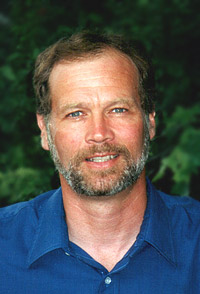
Kenneth Miller
Kenneth Miller: I must confess that I was surprised by the tone and the content of your writing, and especially by your eagerness to move the discussion away from science. You invoked history, writing that revelation came at the wrong time and to the wrong people. Apparently a proper God would have avoided “gaping peasants,” and delivered his message instead to high table at Oxford. You deliberately misread my reference to personal belief as a claim of special revelation, and even found time to ridicule a tiny American state—ironically, the very one which first gave birth to the concept of religious freedom. Why such departures from the issue at hand?
Perhaps it is because you sense the inherent weakness of your argument. Your essay cited three scientific points, which, you were confident, would have kept us from “adopting monotheism.” Ironically, in essence these were: 1) our species had a beginning, 2) the universe had a beginning, and 3) our existence will come to an end. Last time I looked, each of these was actually a teaching of the great monotheistic faiths. So much for the profound contradiction you sought.
You tip your hand when invoking extinction as a problem for faith, having fixed your arrow on nothing more sophisticated than an “Eden-based evolutionary fairy-story.” You declare yourself, just as young-earth creationists do, unable to stretch the cloth of Genesis around the Big Bang, mass extinction, and human evolution. But scripture reflects the flawed cosmology of its age, just as one might imprint today’s imperfect and incomplete science on the specifics of either your disbelief or my faith. Finding that old conceptions of nature are wrong, just as many of today’s theories surely are, does not even begin to invalidate the religious message that we live in a universe reflecting the will and rationality of a creator. You say that the natural order is harmonious. I agree. At issue is the source of that harmony.
You say that the grand sweep of the cosmos makes “pathetic nonsense” of the notion that human existence is part of a plan, but on what scientific basis do you make that judgment? In reality, the potential for human existence is woven into every fiber of that universe, from the starry furnaces that forged the carbon upon which life is based, to the chemical bonds that fashioned our DNA from the muck and dust of this rocky planet. Seems like a plan to me.
I was particularly impressed—but not in a good way—by your misuse of Einstein. In saying that there are “no miracles,” he was not ruling out the divine, but speaking to the scientific comprehensibility of nature. Einstein also said there are two ways to live: as though nothing is a miracle, or as though everything is. I choose the latter, and clearly, so did he. Finally, you say that I am an “opponent” who simply does not know what you are talking about. Mr. Hitchens, I regard you as a friend, not an opponent, and would suggest that the real problem is I understand what you are talking about all too well.
Hitchens: To take these points in reverse order: Albert Einstein took a Spinozist worldview that excluded the idea of a personal god or a deity that intervened in human affairs. The natural order does not respond to prayer or propitiation: it maintains its extraordinary regularity. This may not rule out a certain non-specific deism or pantheism, but it does make nonsense of the idea of a god to which human beings can address themselves.
The argument from design has seldom been stated more sloppily than in the “grand sweep” paragraph that (in ascending order) undergirds this misreading of Einstein. Pray tell, is it all designed, or just the apparently harmonious bits? The impending collision between our galaxy and Andromeda: part of the plan or not? A series of lifeless failed planets in our own solar suburb: good design or random coincidence? As with every other such invocation, the fans of the designer must convict him either of a good deal of waste and fumbling or a great deal of cruelty and indifference, or both.
It is cheap to compare me to a young-earth creationist just because I suggest that one must choose between “scripture” and science. The former does indeed reflect “the flawed cosmology of its age,” but that is precisely because it is a work of man and not a work of a deity. Which was my original point.
I cannot see how this insistence on an apparently designed harmony can be squared with your original assertion that god is “the answer to existence, not part of existence itself” or with your scorn for the idea that god is “an ordinary part of the natural world.” Is he or isn’t he the key to the natural order, or at any rate a dynamic element in it? I can understand you avoiding my question about resurrection, but if you want to stay focused on science then you can’t have this both ways.
It’s good of monotheists to accept that things have beginnings and ends. (“By god, sir,” as Samuel Johnson said in a slightly different connection, “they had better”.) I suppose one difference here is the eschatological one, or the way in which religion looks forward to the end. That important distinction to one side, the materialist view is simply that science can provide us, and indeed has provided us, with explanations for the origin and the terminus, of our cosmos and our species, that require no supernatural element. If this is not a scientific refutation of faith (which it isn’t, since faith isn’t susceptible to such procedures) it makes faith and science look increasingly hard to reconcile.
I was ridiculing you and not Rhode Island, as any careful reader will see. And yes, I do think that the Archangel Gabriel and the Virgin Mary and other apparitions ought at least once in human history to have shown themselves to people who were able to read and write, who were not terrified of demons and ghosts, and who possessed the ability to test evidence in the crucible of experiment. It hasn’t happened yet and I predict that it isn’t going to happen, either. Nonetheless, the witchdoctors and shamans can always count on the credulity of second-and-third-hand witnesses, descending to tenth-and-twentieth hand, some of whom will sadly claim to base their beliefs on scientific method.
Miller: You know, Christopher, I think we’re making progress. In your invocations of Einstein and Spinoza there is a grudging, if indirect, deference to the argument in my original essay—specifically, that faith “includes science, but then seeks the ultimate reason why the logic of science should work so well.” In each of your contributions to this dialogue, you’ve dismissed this as implying nothing more than deism, as if that alone was sufficient to refute it. As you well know, it is not.
Classic deism involves a God who is creator and prime mover, yet uninvolved in the affairs of his universe. But apply some logic here. By what principle would a God, capable of creating such vastness, be constrained from intervening in its affairs? Clearly, that restraint could only come by choice, and given such power, it would have to be a willing choice. The distinction between theism and deism, therefore, is really a claim about the personality of God, and the nature of his actions (or lack of same) in our created world. Earlier, I wrote that the atheist places God within the realm of science to investigate and test. The arguments you raise against scripture and reports of the miraculous take this form exactly, and that is also why they fall short—because they consider God to be a part of nature rather than nature’s cause. I do wonder what sort of God would meet your tests for clarity of teaching and evidence of existence, and I would love to hear your answer.
I accept that your first response was an attempt at personal ridicule. However, I wonder why you resort to such tactics if the logic of your case is so compelling. You note sarcastically that it is “good of monotheists to accept that things have beginnings and ends.” Can you possibly be serious, when Abrahamic monotheism has always spoken of ends and beginnings? As you acknowledge, science has indeed given explanations for “our cosmos and our species that require no supernatural element.” On that point you and I agree. But this means only that science has now confirmed nature’s sufficiency to fulfill the promised work of its creator.
You ask if all is designed, including galactic collisions, “failed planets,” and the extravagant waste of nature. Yet by what rubric do you know the “purpose” of galaxies and planets, in order to pronounce them “failed?” There is waste and death in nature and the cosmos, but there is something else as well. Amid the material from which you draw the bleak conclusion of purposeless chaos, there are the very laws and elements that make evolution (and humanity) possible. A great biologist, whom we both admire, once wrote that there was “grandeur in this view of life,” and science has done nothing since to set that judgment aside. A world of “endless forms, most beautiful and most wonderful” is the one in which we find ourselves, and I believe there is a reason for that.
Hitchens: That there might have been a “mind” at the beginning of the cosmos does not in the least entail that there still is one, or that its abstention from intervention in human affairs is conscious. (If the mind took the form of an intelligent and self-conscious “god”, as Lucretius pointed out, it would obviously wish to stay out of our petty quarrels and strivings.) And this mind would also need to have been created or inspired by still another mind, as in turn would that mind. No wonder that Christians prefer to start speaking about “mysteries” at this point.
Incidentally, are you a Christian? I have no idea which religion you do or do not believe in. Do you think that this eternal mind waited until two thousand years ago, then donated a son for a human sacrifice and thus enabled us to purge ourselves from sin? Or do you prefer to think that Mohammed is god’s messenger, or that the eternal mind has made a covenant with one special tribe? With atheists, it is always possible for our opponents to know and understand (if they choose to) what we believe (or do not believe). With religious people it is possible to spend a long time in discussion without ever discovering precisely what role they believe the supernatural to play in our lives. And no two claims are ever quite the same—further proof that the whole religious enterprise is improvised by primates.
To answer your challenge: if I had faith I would not presume to act or think as if god owed me an explanation. Surely that is the point of faith to begin with: to fill the unbridgeable void between evidence and the entire lack of it. That’s why I consider it the most over-rated of the virtues.
Miller: As we conclude, I am struck by your careful avoidance of our question—whether science makes belief in God obsolete. Instead you puzzle over my religion (I’m a Catholic) and invoke the old standbys: scripture is unreliable, faiths contradict, miracles are delusional fabrications, and God’s reported interventions in human affairs make no sense (to you). You dismiss a “mind” as first cause by invoking an infinite regression of minds—ironically unaware that your own view requires exactly that—an infinite regression of natural causes. A theist sees the logical problem here, but apparently you do not.
You avoided my direct question (to you, a “challenge”) of what might convince you of God’s reality. You wrote, in effect, that no evidence would do—a very fair summary of your views on this issue, I admit.
In the end you have no answer to why science works, why the physical logic of natural law makes life possible, or why the human mind is able to explore and understand nature. And I agree that there is no scientific answer to such questions. That is precisely the point of faith—to order and rationalize our encounters with the world around us. Faith is human, and therefore imperfect. But faith expresses, however poorly, a reality that includes the scientific experience in every sense, and therefore has become more relevant than ever in our scientific age. ![]()
Skeptical perspective on the Big Questions…
-
 Origins & The Big Questions
Origins & The Big Questions
Conference 2008 (5 Part Set)
with Donald Prothero, Leonard Susskind, Paul Davies, Sean Carroll, Christof Koch, Kenneth miller, Nancey Murphy, & Michael Shermer -
Today, there is arguably no hotter topic in culture than science and religion, and so much of the debate turns on the “Big Questions” that involve “origins ”: the origin of the universe, the origin of the “fine-tuned” laws of nature, the origin of time and time’s arrow, the origin of life and complex life, and the origin of brains, minds, and consciousness. Now, science is making significant headway into providing natural explanations for these ultimate questions, which leaves us with the biggest question of all: “Does science make belief in God obsolete?” we have assembled some of the world’s greatest minds to discuss some of the world’s greatest questions. In 2008, the Skeptics Society held a conference wherein we assembled some of the world’s greatest minds to discuss some of the world’s greatest questions…
READ more about this conference and order the 5-part DVD set.
OR, order single DVDs: part 1 | part 2 | part 3 | part 4 | part 5
-
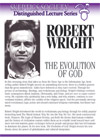 The Evolution of God
The Evolution of God
by Robert Wright -
From the Stone Age to the Information Age, Robert Wright unveils an astonishing discovery: there is a hidden pattern that the great monotheistic faiths have followed as they have evolved. Through the prisms of archaeology, theology, and evolutionary psychology, Wright’s findings overturn basic assumptions about Judaism, Christianity, and Islam, and are sure to cause controversy. He explains why spirituality has a role today, and why science, contrary to conventional wisdom, affirms the validity of the religious quest. And this previously unrecognized evolutionary logic points not toward continued religious extremism, but future harmony. READ more and order the DVD.
-
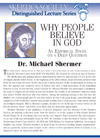 Why People Believe in God
Why People Believe in God
by Michael Shermer -
Shermer presents data from an empirical study of 10,000 Americans — why do people believe in God? Why is belief in God increasing, not decreasing as predicted? How the fact that we live in an age of science influences the reason people give for their faith. How people assume others believe in God for different reasons than they do. The psychology of rationalizing beliefs arrived at for non-rational reasons.
READ more and order the DVD.
Other Books & Lectures on Evolution & Creationism
Our online store has a wide selection of books and lectures (at Caltech) on the topics of evolution and creationism.


Tim Farley illustration by Neil Davies. Card design by Crispian Jago.
2011: A Year in Review
with Tim Farley
SKEPTICALITY EPISODE 173
This week on Skepticality, host Derek sits down with Tim Farley to reflect on what happened in the skeptical world over the course of 2011 and ponder what is in store for 2012. Tim Farley is the creator of the website Whats the Harm (a catalog of actual cases of people suffering physical, medical, financial or other harm because of their beliefs in concepts not supported by science) and Skeptic History (a collection of historical dates of interest to skeptics).

OUR ANNUAL FUNDRAISING DRIVE IS ON NOW
Help Send Skepticism 101 into the World!
- Click here to read our new plan to take Skepticism to the next level!
- Click here to make a donation now via our online store.
Monthly Recurring Donation Options Now Available
We encourage you to choose the monthly recurring donation option. Simply tell us how long you want your donation to recur (using the drop-down menu on the donation page) and we’ll set up automatic withdrawal for the amount you select.
Just for considering a donation, check out our free PDF download
created by Junior Skeptic Editor Daniel Loxton.


